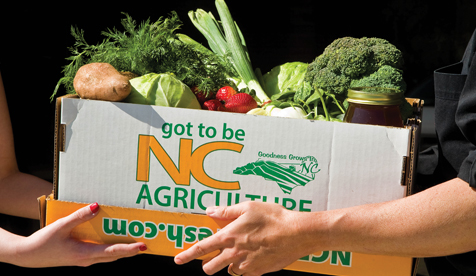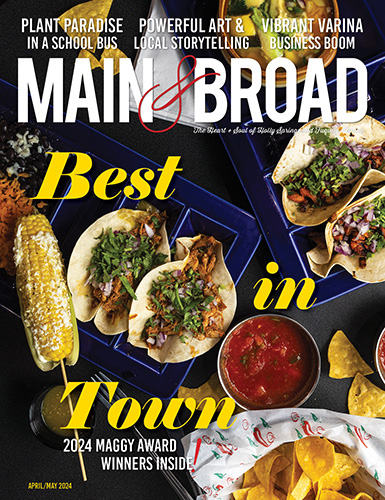Hundreds of Triangle families will be eating fresh fruits and veggies that arrived straight from the farm to their doorstep this summer.
“It doesn’t get any fresher,” said Courtney Tellefsen, founder of The Produce Box, a co-op of moms (and a few men) delivering produce from a community of farm families every week.
The concept for home delivery of fresh produce from North Carolina farms started when Tellefsen participated in a traditional community supported agriculture farm membership, but couldn’t always get to the farms to reap the harvest because of her family’s busy schedule, and wasted her up-front membership costs of about $600.
“Ultimately, although I hated to admit it and was embarrassed to say it, I just couldn’t seem to get myself together enough to get there and get that bag of goodies each week. And finally, I chose not to renew for the following year,” she said. “So I thought if I could change a few of the parts of the program that didn’t work for me, maybe it would work for lots of other people too.”
Turns out she was right. In her fourth season, the response has been overwhelming, with more and more families signing up for The Produce Box delivery.
“They love that we personally meet the farmers we work with and know exactly where every item comes from. They like that it’s delivered to their door and that they have a hand in supporting this fantastic group of hard-working farmers,” she said. “Some call us their summer Santas or veggie fairies.”
How It Works
Members go online and create an account and receive an email every Friday letting them know what produce is available for the following week. Families have till Sunday night to go online and choose from an A, B, C or O (for organic and/or chemical free) variety box featuring veggies and fruit picked at the peak of ripeness, not ripened on a truck on its way here from another state or country. Each costs $22.

They can add other specialty products like honey, bread, jams, etc. According to Tellefsen, families can skip the week or even future-skip a set of weeks if they know they will be out of town.
“We are not an online grocery store,” said Tellefsen. “We work with our farmers to build the boxes each week based on what our members say they want, and just as importantly, what the farmers have and what is at the peak of ripeness.”
The harvest season goes from mid-April to November and includes up to 97 different crops, according to crop coordinator Kevin O’Conell. There are strawberries, lettuces and asparagus in the spring; corn, peaches, melons, herbs, tomatoes and cucumbers in the summer; apples, squashes and potatoes in the fall, to name a few.
“We have a farmer in Sylva, N.C., with a century old orchard, and those apples are delicious,” Tellefsen said. “Members love the green beans, popping Dixie Lee peas out of their shells and husking our sweet N.C. corn as well.
“Many say it reminds them of all the ‘fun’ work their grandparents used to make them do.”
Farm Fairies
Becky Enzor owns Drowning Creek Farm in Fairbluff, N.C., in the western part of Columbus County, and is one of the 25 small-to-medium sized farms contributing to the co-op. In her second year, she sells her Asian pears, shiitake mushrooms, persimmons and figs to Tellefsen for a fair market price, but the reward is greater than money.

“It’s a sheer joy that a family is sitting down to eat what we grew the day after we harvested it,” said Enzor. “I grew up on a farm and know what it’s like to have fresh veggies to pick and eat at lunch.
“There’s no substitute for it.”
The farm has been in her husband Jimmy’s family for at least seven generations. A horticulturist and landscaper by trade, she works with the Southeastern Community College in Whiteville to help with its agriculture biotechnology and environmental sciences technology programs by hosting interns and mentoring the next generation of farmers.
She supports initiatives like The Produce Box that allow farmers who use small acreage to produce high quality crops and be able to make a living.
“(Biotechnology) is changing the face of farming and taking care of the land to work in harmony with insects,” Enzor said.
Much has evolved since she was studying agriculture at the University of Georgia in the ’70s. “I would have been the laughing stock if I thought we would ever be organic on the East Coast because of our high humidity,” she said. “Now I am a one of those growers. To me, that’s very exciting.”
Farmers are also returning to our roots with heirloom varieties and diversifying crop varieties so farmers don’t have to compete with each other.
For example, Tellefsen said families can expect kiwi and even rice from N.C. farms this year. For Tellefsen, connecting producers with consumers is what The Produce Box is all about.
“We want to connect farms and families, support our local economy and educate members on the benefits of eating farm-fresh whole foods picked or produced at the peak of ripeness for maximum flavor and nutritional value,” she added.
For more information, visit www.theproducebox.com.






